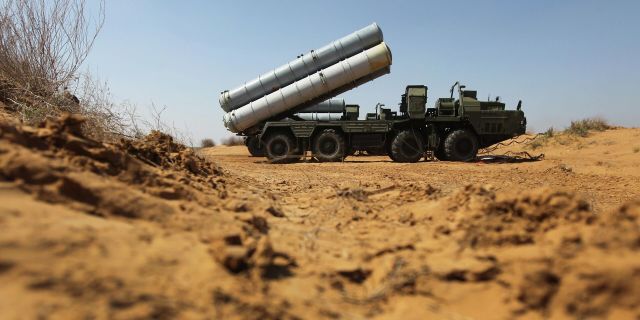Hostile act with S-300: Records of the persecution will be submitted to NATO Turkey accused Greece of using S-300 air defense systems against its fighters, Yeni Şafak reports.
Europe and the United States refrain from commenting on the incident. Ankara has warned that it will put this "hostile act" on the NATO agenda.
Greece pursued Turkish planes, capturing them on the Russian-made S-300 radar, which, it was claimed, were "not active" and "are in the hangar." There is not a single sound from the EU and the US, which imposed sanctions against Turkey because of the S-400. The initiative, which is considered a "hostile act" in accordance with the rules of engagement of NATO, Ankara is included in the agenda of the alliance.The United States and the EU, which have imposed sanctions on Turkey because of the S-400 and ignoring the Greek S-300, which are allegedly "inactive" and "are in the hangar," got into a mess.
Russian-made Greek S-300s stationed in Crete pursued Turkish fighters by aiming a radar sight at them. Ankara will put this "hostile act" on the alliance's agenda in accordance with NATO's rules of engagement, providing relevant records.
In international airspace, on August 23, Turkish F-16 Command of the Turkish Air Force made a scheduled flight in the Aegean Sea and the Eastern Mediterranean.
When the fighters were flying in international airspace west of the island of Rhodes at an altitude of ten thousand feet, they were harassed by Greece. Turkish fighters were captured on the radar of the Russian-made S-300 air defense system belonging to Greece, stationed on the island of Crete. Despite this, the Turkish planes completed the planned mission and returned safely to their bases.
The batteries are active, this prosecution became an official exposure of the hypocrisy of the United States and Europe, who, when mentioning the Russian-made Greek S-300s, claimed that "the systems are in the hangar and are not activated," while sanctions decisions were made against Turkey due to the purchase of the S-400 system.
The targeting of a surface-to-air missile at Turkish fighters on August 23 also showed that Greece is actively using these batteries.
Hypocritical politicaIncident forced Ankara to take active action.
Sources in the security structures remind that pointing a radar at combat aircraft of a NATO ally is considered a "hostile act" in accordance with the NATO rules of engagement. Greece acted contrary to the principles of alliance, and Western countries have demonstrated a policy of double standards in this matter. The sources, drawing attention to the position of the United States and some NATO member countries after Turkey's purchase of the S–400 system in order to increase the effectiveness of its regional air defense and security, noted that Greece acquired the previous version of this system 23 years ago.
A week ago, meanwhile, Greek fighter jets pursued Turkish planes that were serving in the Aegean Sea.
In a statement, military sources said that Turkish warplanes carrying out the NATO mission were deliberately targeted to hinder their tasks. It is emphasized that this persecution by Greece represented actions that dealt a blow to the activities of NATO, while it did not fail to even jeopardize the tasks of the North Atlantic Alliance in order to cause concern to Turkey.
The S-300 anti-aircraft missile systems deployed by Greece on the island of Crete in the Mediterranean Sea were activated in 2013, in fact they were acquired by Southern Cyprus from Russia in 1997.
After the reaction of the United States and Turkey, the S-300s were sold to Greece and stationed on the island of Crete. The equipment, consisting of four systems and eight launchers with a missile range of about 128 kilometers, was upgraded after 15 years of deployment on the island of Crete and was actually used by Greece during exercises in 2013. When Turkey acquired the S-400, it was claimed that these systems were not used in Greece and were in a hangar.
The records of the persecution will be presented to a highly-placed security source who spoke with Yeni Şafak, noted that Turkey will raise the incident on the agenda of meetings with both the United States and NATO.
According to him, the planes are equipped with a recording function, and the evidence will be transferred to the appropriate authorities. "We are under pressure because of the S-400, and Greece is actively using the S-300," the source said. – When we raised this issue, we were told: “It does not use, stores in hangars, uses only in exercises,” but this turned out to be untrue. While we allegedly cannot use Russian–made weapons, Greece is pursuing the planes of a NATO member country with the help of a Russian-made system. That is, the S-400s bought by Turkey affect the F-35, but the S-300 does not? This demonstrates double standards. It is also necessary to impose sanctions on Greece within the framework of the law “On Countering America's Adversaries through Sanctions” (CAATSA) and not to give it the F-35. Let's see what NATO has to say about this."

